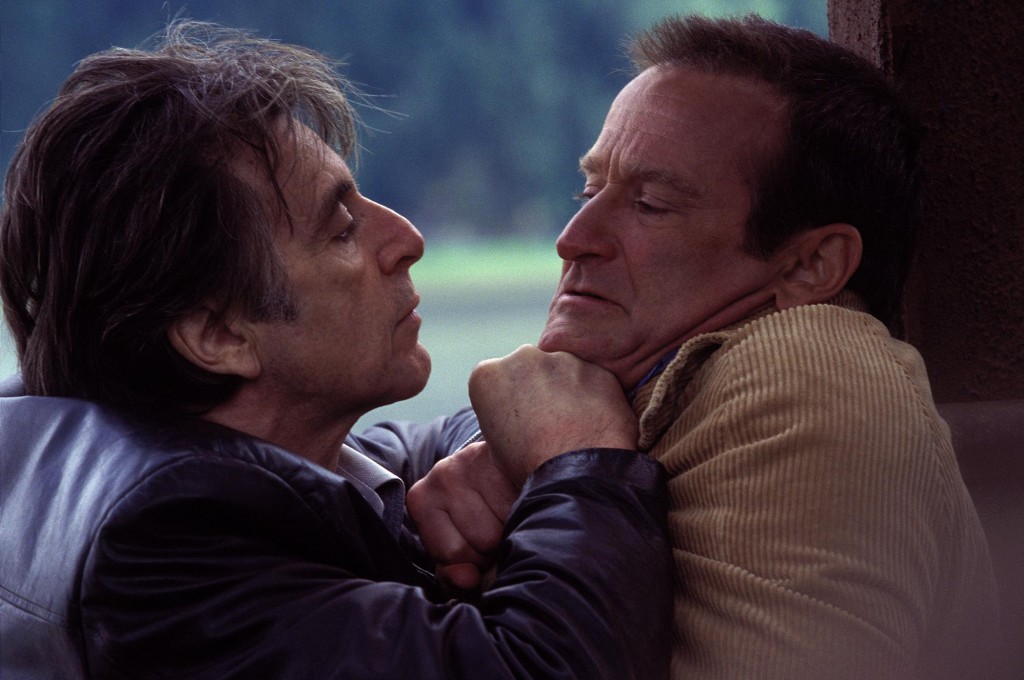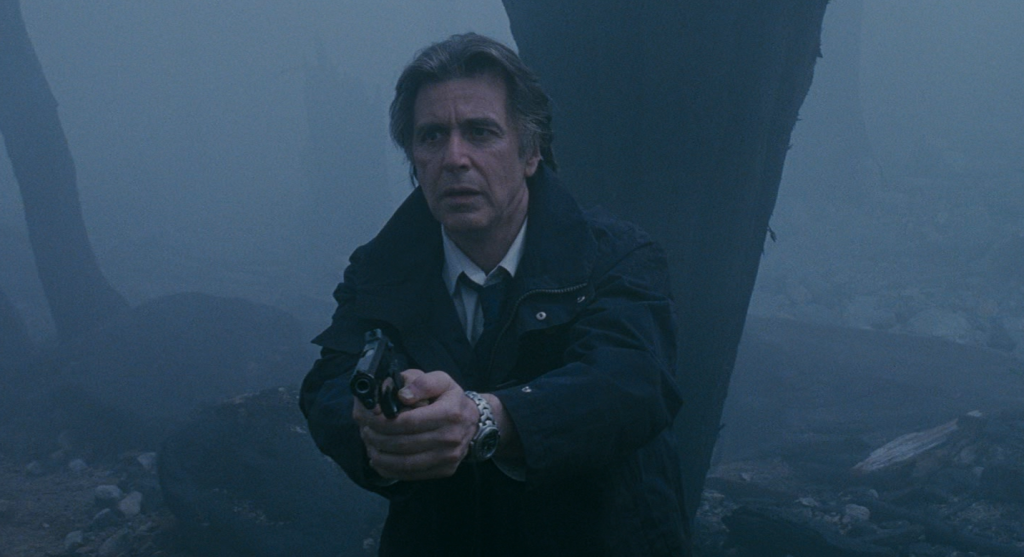Insomnia (2002)
CAST: Al Pacino, Robin Williams, Hilary Swank, Martin Donovan, Maura Tierney, Jonathan Jackson
REVIEW:
WARNING: THIS REVIEW WILL REVEAL ASPECTS OF THE PLOT
In hindsight, after such impressive entries on Christopher Nolan’s filmography as The Dark Knight, The Prestige, Inception, and Interstellar, Insomnia feels low-key and even slight, lacking the grandiose ambition the British director would later become known for. Ranked alongside his later efforts (Insomnia was only his third film after little-seen indie Following and the critically acclaimed mind-bender Memento), it’s one of his least memorable films, but a “lesser” Christopher Nolan film is still a taut and intriguing murder mystery/psychological thriller worth viewing.
Los Angeles homicide detective Will Dormer (Al Pacino), an aging thirty year veteran and “hero cop”, looks tired even when we first see him stepping off a plane in Nightmute, “Halibut Fishing Capital of the World”, a remote small town in the north of Alaska, where the rugged landscape is bathed in eternal sunlight for months at a time. He’s arrived far from his jurisdiction with his younger partner Hap Eckhart (Martin Donovan), ostensibly to assist the locals in a murder investigation, but really because Internal Affairs is going through their department with a fine tooth comb looking for dirt, and their chief has shipped them out of town. The local case is the brutal beating death of a 17-year-old girl, possibly by her abusive boyfriend (Jonathan Jackson), or by an unknown mystery man she was supposedly seeing on the side. Together with local fledgling detective Ellie Burr (Hilary Swank), who studied Dormer’s cases at academy and is thrilled to be working with her idol, Dormer and Eckhart stakeout a secluded fishing cabin where the killer might show up, lured by a piece of evidence he left behind. But the ambush goes terribly wrong. The killer gives them the slip, and in a confusing chase on a beach shrouded in smothering fog, Will fires on a shape in the mist and discovers he’s killed his own partner. Will panics. He scapegoats the killer, and uses a cop’s knowledge of crimes and forensics to falsify or conceal evidence of what really happened. But someone saw the truth: the killer himself, a local writer named Walter Finch (Robin Williams), who uses this to draw Will into a devil’s bargain to protect each other to save their own skins. And as days and nights drag on, and Dormer finds sleep elusive, his increasingly disoriented state makes him more susceptible to Finch’s manipulations. Meanwhile, his admirer Ellie starts to grow suspicious of her idol’s version of events.
Perhaps because he was helming his first big-budget Hollywood movie, perhaps partly because it was a remake of a 1998 Norwegian film of the same name directed by Erik Skjoldbjaerg and starring Stellan Skarsgard, Insomnia lacks a few Nolan trademarks. It remains far smaller-scale than his later films, and while the script briefly tosses around a red herring in Jonathan Jackson’s abusive boyfriend, it doesn’t sport any major Nolan twists. Compared to the convoluted labyrinth of The Prestige or Inception, the plot, while featuring its fair share of twists and turns, is downright simple. There are also a couple plot contrivances; what are the odds, for example, that the Los Angeles detective would fly to the one remote Alaskan town featuring the rookie who’s just so coincidentally studied his cases at academy and is his biggest fan?
While he doesn’t attempt any large-scale set pieces here, Nolan directs with his usual smooth assurance, opening with aerial shots of frozen ice fields and mist-shrouded forest making the remote Alaskan wilderness look both ruggedly beautiful and ominous and foreboding. The score throws in discordant sounds as Dormer’s insomnia-induced disorientation and hallucinations deepen: sharp musical cords, barking of a nonexistent dog, flashes of light and visions of the murder victim and his fallen partner. File Insomnia under psychological thriller. While the killer’s role has been bumped up from the original, Robin Williams doesn’t show his face until halfway through, and even then his screentime is a fraction of Pacino’s. The real core of the story is less about Dormer versus Finch—in fact, Finch is arguably a bit of a plot device— than about the murky moral ambiguity Dormer wades into. Skarsgard’s detective in the original showed an even darker side, but Dormer is still far from a purely heroic figure. Finch and the movie itself floats the possibility that there may have been a sliver of relief when Dormer realizes he’s killed his partner—who was about to cut a deal with Internal Affairs that could have caused trouble for Dormer—and he ends up actively in cahoots with the killer he’s pursuing to protect his own life and reputation. The insomnia Dormer falls victim to is a manifestation of his own guilt slowly consuming him alive. The uneasy “partnership” between Dormer and Finch pushes Insomnia into nearly Hitchcockian territory. Nolan breaks things up with three action sequences. The first two—the beach chase in the fog, and a later chase across a log jam—are tense and exciting, but the movie somewhat disappointingly wraps up with a generic cop vs. killer shootout at an isolated cabin. With the earlier pseudo-Hitchcokian scheming, one would have hoped for something a little more clever and creative than “the movie’s almost out of runtime and audiences will want a little action, so let’s shoot each other!”.
 The cast is headlined by three Oscar winners, Al Pacino, Robin Williams, and Hilary Swank, but this is Pacino’s movie. Will Dormer is yet another of Pacino’s strung-out cops on the verge of burning out (it’s easy to imagine him as an older version of Pacino’s character from Sea of Love or Heat, further down the line), but his performance is more restrained than one might expect. There are still occasions of frothy Pacino outbursts, but they’re few and far between. Instead of yelling and screaming, Pacino uses his weathered face and body language to convey Dormer’s increasing state of disorientation and exhaustion. He already looks haggard stepping off the plane, and only goes downhill from there. Pacino has a good face for this role; looking at the lines in his face and the perpetual bags of weariness under his eyes, the smoky rasp of his voice, we can feel the thirty years of heinous crimes he’s fought to solve, and the corruption of his latest case eating him alive from the inside out. Will Dormer won’t go down as one of Pacino’s iconic characters, but he’s solid and effective in the role, and for an actor increasingly guilty of slumming and picking up easy paychecks, it probably represents one of his best performances in a while. Robin Williams has limited screentime (almost all in the movie’s second half), but demonstrates again that he is capable of giving a low-key and subdued performance (not that there should be any lingering doubts about that after his Oscar-winning performance in Good Will Hunting). Walter Finch is not a raving psychopath, but a calm, logical, outwardly mild-mannered man who doesn’t make an overtly menacing or dangerous impression, and only occasionally—such as in his disturbingly matter-of-fact defense of his brutal crime—shows a fleeting glimpse of a darker undertone. Hilary Swank gives Ellie a bright-eyed earnestness slowly turning to suspicion of her idol, although the character itself is something of a plot device. Martin Donovan and Jonathan Jackson are fine in smaller roles, and Maura Tierney makes the most of a pretty thankless part.
The cast is headlined by three Oscar winners, Al Pacino, Robin Williams, and Hilary Swank, but this is Pacino’s movie. Will Dormer is yet another of Pacino’s strung-out cops on the verge of burning out (it’s easy to imagine him as an older version of Pacino’s character from Sea of Love or Heat, further down the line), but his performance is more restrained than one might expect. There are still occasions of frothy Pacino outbursts, but they’re few and far between. Instead of yelling and screaming, Pacino uses his weathered face and body language to convey Dormer’s increasing state of disorientation and exhaustion. He already looks haggard stepping off the plane, and only goes downhill from there. Pacino has a good face for this role; looking at the lines in his face and the perpetual bags of weariness under his eyes, the smoky rasp of his voice, we can feel the thirty years of heinous crimes he’s fought to solve, and the corruption of his latest case eating him alive from the inside out. Will Dormer won’t go down as one of Pacino’s iconic characters, but he’s solid and effective in the role, and for an actor increasingly guilty of slumming and picking up easy paychecks, it probably represents one of his best performances in a while. Robin Williams has limited screentime (almost all in the movie’s second half), but demonstrates again that he is capable of giving a low-key and subdued performance (not that there should be any lingering doubts about that after his Oscar-winning performance in Good Will Hunting). Walter Finch is not a raving psychopath, but a calm, logical, outwardly mild-mannered man who doesn’t make an overtly menacing or dangerous impression, and only occasionally—such as in his disturbingly matter-of-fact defense of his brutal crime—shows a fleeting glimpse of a darker undertone. Hilary Swank gives Ellie a bright-eyed earnestness slowly turning to suspicion of her idol, although the character itself is something of a plot device. Martin Donovan and Jonathan Jackson are fine in smaller roles, and Maura Tierney makes the most of a pretty thankless part.
Looking back after the heights Christopher Nolan has climbed to since, no one is likely to mention Insomnia in discussions of Nolan’s best films—in fact, it’s seldom mentioned at all—but even as one of Nolan’s comparatively weaker films, it’s no slouch. It’s tense and intriguing, and steeped in moral ambiguity, and fans of Hitchcokian psychological thrillers may find much to appreciate here.
* * *
